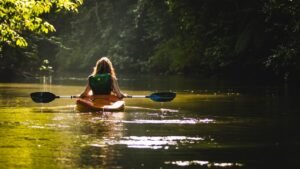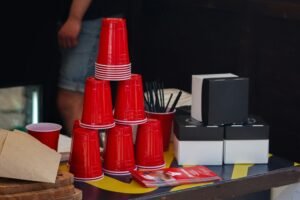Comprehensive Guide of Wine Tasting
Overview
Wine tasting is a sophisticated and enjoyable hobby that involves sampling and evaluating different types of wines. This activity allows enthusiasts to explore the diverse flavors, aromas, and characteristics of various wines from around the world. Wine tasting can be done at vineyards, wine bars, or at home, and often includes learning about the wine-making process, grape varieties, and regional differences. Participants engage their senses to appreciate the color, smell, taste, and texture of the wine, making it a multi-sensory experience. Wine tasting not only enhances one’s appreciation for wine but also fosters social interactions and connections among fellow wine lovers.
History
The history of wine tasting dates back thousands of years, with evidence of wine production found in ancient civilizations such as Mesopotamia, Egypt, and Greece. The Greeks and Romans were particularly influential in the development of wine culture, establishing vineyards and promoting the appreciation of wine. The practice of tasting wine as a formal activity began to take shape in the 19th century, particularly in France, where wine connoisseurs started to evaluate wines based on their quality and characteristics. The establishment of wine competitions and the role of sommeliers in restaurants further popularized wine tasting, leading to the modern wine tasting events and festivals we see today.
Popularity and Demographics
Wine tasting has gained immense popularity worldwide, appealing to a diverse demographic of individuals. According to industry reports, the global wine market is expected to grow significantly, with wine tasting events becoming a common social activity. This hobby attracts people of various ages, but it is particularly popular among adults aged 25 to 55, who often seek out wine tasting experiences as a form of entertainment and education. Wine clubs and tasting events have also seen a rise in participation, with many individuals joining to expand their knowledge and appreciation of wine. Additionally, the growth of wine tourism has made it easier for enthusiasts to visit vineyards and participate in tastings, further enhancing the hobby’s appeal.
Sponsored Hobbyists and Vendors
Become a Sponsor!
Affiliate Disclaimer: Throughout some sections below, Hobby Spotlight may suggest some tools, equipment or material using affiliate links. By purchasing any of those items, Hobby Spotlight may earn a small commission. This helps fund our website, content and services without directly charging our users.
Getting Started
Essential Wine Tasting Tools:
Beginner
- Wine Tasting Journal: A journal to record tasting notes and impressions.
- Wine Aerator: A device to aerate wine for better flavor.
- Wine Glass Set: A set of basic wine glasses for tasting.
- Wine Opener: A simple corkscrew for opening wine bottles.
- Wine Chiller: A chiller to keep white wines at the right temperature.
Intermediate
- Decanter: A vessel for aerating and serving wine.
- Wine Tasting Guide Book: A book that provides insights into wine tasting techniques.
- Wine Preservation System: A system to keep opened wine fresh longer.
- Wine Thermometer: A thermometer to check the ideal serving temperature of wine.
- Wine Aroma Kit: A kit to help identify different wine aromas.
Basic Requirements and Initial Setup:
- Wine Glasses: Invest in a set of quality wine glasses designed for different types of wine (red, white, sparkling) to enhance the tasting experience.
- Wine Selection: Start with a diverse selection of wines, including various regions, grape varieties, and styles to explore different flavors and aromas.
- Tasting Journal: Keep a dedicated journal to record your impressions, notes on flavors, aromas, and personal ratings for each wine you taste.
Fundamental Skills to Learn:
- Wine Aroma Identification: Develop the ability to identify and describe various aromas in wine, such as fruity, floral, or earthy notes.
- Tasting Techniques: Learn the proper techniques for tasting wine, including how to swirl, sniff, sip, and savor.
- Food Pairing Knowledge: Understand the principles of pairing wine with food to enhance both the wine and the meal.
- Understanding Wine Regions: Familiarize yourself with key wine-producing regions and their characteristic styles and grape varieties.
- Wine Storage and Serving: Learn the best practices for storing wine and serving it at the appropriate temperatures.
Sub-Hobby/Common Activities:
- Wine and Food Pairing Events: Attend or host events that focus on pairing different wines with complementary dishes.
- Winery Tours: Visit local wineries to learn about the winemaking process and taste wines directly from the source.
- Wine Education Classes: Enroll in classes or workshops that cover topics such as wine tasting, regions, and varietals.
- Blind Tasting Challenges: Participate in blind tasting sessions to test your ability to identify wines without prior knowledge.
- Wine Collecting: Start a collection of wines, focusing on specific regions, vintages, or varietals that interest you.
Terminology:
- Aroma: The smell of wine, which can include various scents derived from the grapes, fermentation, and aging process.
- Body: The weight and fullness of the wine in the mouth, often described as light, medium, or full-bodied.
- Finish: The lingering taste and sensation left on the palate after swallowing the wine.
- Tannins: Natural compounds found in grape skins, seeds, and stems that contribute to the wine’s structure and astringency.
- Acidity: The crispness or tartness of wine, which balances sweetness and enhances freshness.
- Varietal: A wine made primarily from a single grape variety, such as Cabernet Sauvignon or Chardonnay.
- Terroir: The unique environmental factors, including soil, climate, and topography, that influence the characteristics of the wine produced in a specific region.
- Decanting: The process of pouring wine from its bottle into another container to aerate it and separate it from sediment.
- Vintage: The year in which the grapes were harvested, often indicating the quality and characteristics of the wine.
- Sommelier: A trained wine professional who specializes in all aspects of wine service and pairing.
Advanced Topics and Specializations
Advanced Wine Accessories:
- Professional Wine Aerator: A high-quality aerator that enhances the flavor and aroma of wine by allowing it to breathe.
- Wine Preservation System: A vacuum system that removes air from opened wine bottles to preserve freshness and flavor.
- Wine Tasting Journal: A detailed journal designed for recording tasting notes, ratings, and personal reflections on various wines.
- Decanter with Aerating Pourer: A stylish decanter that allows for optimal aeration while serving wine, enhancing its taste.
- Wine Thermometer: An accurate thermometer specifically designed for measuring the temperature of wine for optimal tasting.
Advanced Projects and Achievements:
- Wine and Food Pairing Events: Organizing and hosting events that showcase the perfect pairings of wines with various cuisines, enhancing the tasting experience.
- Personal Wine Cellar Creation: Curating a personal collection of wines, focusing on aging potential and optimal storage conditions to enhance flavor over time.
- Wine Tasting Competitions: Participating in or organizing competitions that challenge participants to identify wines based on taste, aroma, and appearance, showcasing expertise in the field.
Advanced Techniques and Methods:
- Blind Tasting Techniques: Developing skills to identify wines without prior knowledge, focusing on sensory evaluation of aroma, taste, and finish.
- Decanting and Aeration: Understanding the importance of decanting wines to enhance flavors and aromas, particularly for older vintages.
- Terroir Analysis: Studying the impact of geography, climate, and soil on the characteristics of wines, allowing for a deeper appreciation of regional differences.
Specializations and Niche Areas:
- Organic and Biodynamic Wines: Exploring wines produced with organic farming practices and biodynamic principles, focusing on sustainability and environmental impact.
- Rare and Vintage Wines: Specializing in the collection and tasting of rare wines, understanding their history and significance in the wine world.
- Regional Wine Exploration: Focusing on specific wine regions, such as Bordeaux or Napa Valley, to gain in-depth knowledge of their unique varietals and production methods.
- Natural Wines: Investigating wines made with minimal intervention, emphasizing the natural fermentation process and the use of native yeasts.
- Wine Education and Certification: Pursuing formal education and certifications, such as WSET or CMS, to enhance knowledge and credibility in wine tasting.
Future Trends and Innovations:
- Growing interest in sustainable and eco-friendly wine production methods.
- Increased popularity of virtual wine tasting experiences, allowing for global participation.
- Emergence of technology-driven wine apps that assist in tracking personal collections and tasting notes.
- Focus on lesser-known wine regions and varietals, promoting diversity in wine tasting.
- Integration of augmented reality in wine labels to provide interactive tasting experiences.
Technology Integrations:
- Wine Apps: Mobile applications that help users track their wine collections, provide tasting notes, and suggest pairings.
- Smart Wine Coolers: Temperature-controlled storage units that can be monitored via smartphone for optimal wine preservation.
- Online Wine Courses: Virtual platforms offering courses on wine tasting, production, and pairing, making education accessible to all.
- Data Analytics in Wine Production: Utilizing data to analyze consumer preferences and improve wine quality and marketing strategies.
- Blockchain for Wine Authenticity: Implementing blockchain technology to ensure the authenticity and traceability of wines from vineyard to consumer.
Further Learning and Resources
Books:
- Wine Folly: The Essential Guide to Wine by Madeline Puckette and Justin Hammack: An accessible introduction to wine that covers the basics of wine tasting, varietals, and food pairings, making it perfect for novices.
- The Wine Bible by Karen MacNeil: A comprehensive guide that provides an overview of wine regions, grape varieties, and tasting techniques, ideal for those new to wine appreciation.
- Windows on the World Complete Wine Course by Kevin Zraly: An engaging and informative book that teaches the fundamentals of wine tasting and pairing, presented in a user-friendly format.
- The Oxford Companion to Wine by Jancis Robinson: A detailed reference work that covers a wide range of wine-related topics, perfect for those looking to deepen their knowledge and expertise.
- Mastering Wine for the Sommelier by Paul Wagner: A sophisticated guide that delves into advanced wine tasting techniques, food pairing strategies, and the business of wine, ideal for aspiring sommeliers.
- Wine Science: The Application of Science in Winemaking by Jamie Goode: An in-depth exploration of the scientific principles behind winemaking, offering insights into the chemistry and biology that affect wine quality.
Websites:
- Wine Enthusiast, https://www.winemag.com – A comprehensive resource for wine reviews, ratings, and articles on wine culture.
- Wine Folly, https://winefolly.com – Offers educational content, infographics, and guides to help wine lovers understand and appreciate wine.
- Vivino, https://www.vivino.com – A popular app and website for wine ratings, reviews, and recommendations based on user-generated content.
- Decanter, https://www.decanter.com – Provides expert wine news, reviews, and insights from the world of wine.
- Wine.com, https://www.wine.com – An online retailer offering a vast selection of wines, along with tasting notes and food pairing suggestions.
Courses:
- Wine & Spirit Education Trust (WSET) Level 1, https://www.wsetglobal.com – An introductory course covering the basics of wine tasting and wine styles.
- MasterClass with James Suckling, https://www.masterclass.com – Learn wine tasting techniques and how to evaluate wines from a renowned wine critic.
- Coursera: The World of Wine, https://www.coursera.org/learn/wine – A beginner-friendly course exploring the history, production, and tasting of wine.
- Udemy: Wine Tasting: The Ultimate Guide, https://www.udemy.com/course/wine-tasting-the-ultimate-guide/ – A comprehensive course for beginners to learn about wine tasting and appreciation.
- The Wine School of Philadelphia, https://www.vinology.com – Offers a variety of courses from beginner to advanced levels, focusing on wine tasting and education.
Content Creators and Community
Content Creators:
- Wine Folly (YouTube): A channel dedicated to wine education, offering insights into wine tasting, regions, and food pairings, making wine accessible to everyone.
- Wine With Me (Instagram): A vibrant account sharing wine recommendations, tasting notes, and pairing suggestions, perfect for both novices and enthusiasts.
- The Wine Vlog (YouTube): Focuses on wine reviews and tastings, providing viewers with honest opinions and insights into various wine selections.
- Wine and Dine (Instagram): Combines wine tasting with culinary experiences, showcasing delicious pairings and recipes that enhance the wine experience.
- Jancis Robinson (YouTube): A renowned wine critic and author, she shares expert insights on wine tasting, regions, and trends in the wine industry.
- The Wine Guy (TikTok): Engaging short videos that provide quick wine tips, tasting notes, and fun facts about different wines.
- Wine Enthusiast (Website): A comprehensive resource for wine reviews, articles, and tasting events, catering to wine lovers of all levels.
Online Forums and Social Media Groups:
- Reddit – /r/wine: A community for wine lovers to discuss varieties, share tasting experiences, and seek advice.
- Facebook Wine Enthusiasts: Groups where members share wine recommendations, tasting notes, and event information.
- Wine Lovers Club (Discord): An interactive platform for live discussions, sharing wine finds, and organizing tastings.
- Instagram Hashtags (#winetasting, #winepairing): Follow trending posts for inspiration and to connect with fellow wine enthusiasts.
- Pinterest Boards: Explore curated boards featuring wine pairing ideas, tasting tips, and wine-related recipes.
Local Clubs and Organizations:
- Wine Tasting Clubs: Many cities have local clubs where members gather to taste and discuss different wines.
- Local Wineries: Often host tasting events and classes, providing opportunities to learn directly from winemakers.
- Wine and Food Pairing Workshops: Culinary schools and local chefs frequently offer classes focused on pairing wine with food.
- Wine Appreciation Societies: Organizations that promote wine education through tastings, lectures, and events.
- Meetup Groups: Platforms like Meetup.com host local wine tasting events and social gatherings for enthusiasts.
Events, Meetups, and Conventions:
- Wine & Food Festival: An annual event featuring tastings from various wineries, food pairings, and culinary demonstrations.
- Local Wine Competitions: Regional contests that showcase local wines and encourage community participation.
- Wine Expos: Large events where wineries present their products, often including tastings and educational seminars.
- Workshops at Wine Festivals: Learn from experts about wine tasting techniques, food pairings, and more.
- Wine Conventions: Gatherings that combine tastings, networking, and discussions on industry trends and innovations.
Associated Hobbies
- Food Pairing: Wine tasting often goes hand in hand with food pairing, where enthusiasts learn to match different wines with various dishes to enhance the overall dining experience.
- Winemaking: Many wine tasters develop an interest in winemaking, exploring the process of fermentation, grape selection, and aging to create their own unique blends.
- Wine Collecting: Collecting rare and vintage wines can become a rewarding hobby, where enthusiasts seek out limited editions and invest in bottles that appreciate in value over time.
- Wine Education: Engaging in formal wine education, such as courses or certifications, allows enthusiasts to deepen their knowledge about wine regions, grape varieties, and tasting techniques.
- Traveling to Wine Regions: Wine tasting often inspires travel to renowned wine regions, where enthusiasts can visit vineyards, participate in tastings, and learn about local winemaking traditions.
- Wine Blogging: Many wine enthusiasts share their experiences and knowledge through blogging, creating content that reviews wines, discusses trends, and offers tips for fellow wine lovers.
- Attending Wine Festivals: Participating in wine festivals provides opportunities to taste a variety of wines, meet winemakers, and connect with other wine enthusiasts in a festive atmosphere.
- Wine and Cheese Pairing: Exploring the art of pairing wine with cheese can enhance the tasting experience, as different combinations can bring out unique flavors in both the wine and the cheese.
Cost and Budgeting
Initial Investment and Ongoing Costs:
- Initial Investment: The cost to start wine tasting can vary significantly based on the type of wines you wish to explore and the venues you choose. A basic setup, including a few bottles of wine (around $15-$30 each), a set of wine glasses, and a corkscrew, can cost approximately $100-$200. If you opt for wine tasting events or tours, prices can range from $50 to several hundred dollars depending on the location and inclusions.
- Ongoing Costs: Ongoing costs include purchasing wine for tasting, which can vary widely based on your preferences. Regularly attending wine tasting events or joining wine clubs can also add to your expenses, with memberships typically costing between $50 and $300 annually. Additionally, consider costs for food pairings, transportation, and any necessary accessories like decanters or wine coolers.
Budget-Friendly Options:
- Home Tastings: Organize wine tasting events at home with friends, where each person brings a bottle. This can significantly reduce costs while allowing for a diverse selection of wines.
- Local Wine Shops: Many local wine shops offer free or low-cost tastings, allowing you to sample various wines without a significant investment.
- Wine Clubs: Look for wine clubs that offer introductory discounts or trial memberships, which can provide access to quality wines at a lower price.
Where to Buy:
- Local Wine Shops: These shops often have knowledgeable staff who can recommend wines based on your taste preferences and may offer tasting events.
- Wineries and Vineyards: Visiting local wineries can provide opportunities for tastings and purchasing wines directly from the source, often at a better price.
- Online Retailers: Websites like Wine.com and Vivino offer a wide selection of wines, often with customer reviews to help guide your choices, and many provide shipping options.
Money Making
How to Turn the Hobby into a Profession or Side Hustle:
- Wine Tasting Events Organizer: Start a business organizing wine tasting events for individuals, corporations, or special occasions. You can curate selections of wines, provide tasting notes, and create an engaging atmosphere for guests to learn about and enjoy different wines.
- Wine Consultant: Use your expertise in wine to offer consulting services to restaurants, bars, or private collectors. You can help them select the right wines for their menus, create wine pairings for dishes, and provide training for staff on wine service and knowledge.
- Wine Blogging or Vlogging: Create a blog or YouTube channel dedicated to wine tasting. Share your experiences, reviews, and tips on different wines, regions, and tasting techniques. Monetize your content through affiliate marketing, sponsorships, and advertising.
- Wine Importing or Retailing: If you have a passion for sourcing unique wines, consider starting a wine importing or retail business. You can focus on niche markets, such as organic wines or wines from specific regions, and sell them online or in a physical store.
- Wine Education and Workshops: Offer classes or workshops on wine tasting, pairing, and appreciation. You can teach individuals or groups about different wine varieties, tasting techniques, and how to properly evaluate wines. This can be done in-person or through online platforms.
Benefits and Enjoyment
Physical, Mental, and Social Benefits:
- Physical Enjoyment: Wine tasting can involve walking through vineyards, which provides light physical activity. The act of swirling, sniffing, and sipping wine engages the senses and can enhance fine motor skills.
- Mental Stimulation: Engaging in wine tasting encourages critical thinking and sensory analysis. Participants learn to identify different aromas, flavors, and textures, which can improve cognitive function and enhance appreciation for the complexities of wine.
- Social Interaction: Wine tasting is often a communal activity, fostering connections among friends, family, and fellow enthusiasts. Sharing experiences and opinions about different wines can lead to meaningful conversations and strengthen relationships.
Success Stories and Inspirational Examples:
- Jancis Robinson: A renowned wine critic and author, Jancis Robinson has made significant contributions to the world of wine through her books and articles. Her expertise and passion for wine have inspired countless individuals to explore and appreciate the nuances of wine tasting.
- Robert Parker: Known for his influential wine ratings, Robert Parker has shaped the wine industry and consumer preferences. His dedication to wine tasting and evaluation has helped many wine lovers make informed choices and discover new favorites.
- Wine Enthusiast Magazine: This publication has played a pivotal role in educating wine enthusiasts around the world. Through articles, reviews, and tasting notes, it has inspired many to delve deeper into the world of wine and develop their tasting skills.
Ways to Enjoy and Grow in the Hobby:
- Attend Wine Tastings: Participating in local wine tastings or festivals is a great way to explore different varieties and regions. These events often feature knowledgeable hosts who can provide insights and enhance your tasting experience.
- Join a Wine Club: Becoming a member of a wine club allows you to receive curated selections of wines delivered to your door. Many clubs also offer exclusive tastings and events, providing opportunities to learn and connect with other wine lovers.
- Educate Yourself: Read books, take online courses, or attend workshops on wine tasting and appreciation. Expanding your knowledge will deepen your understanding and enjoyment of wine, making each tasting experience more rewarding.
Challenges and Solutions
Common Challenges Faced by Hobbyists:
- Cost of Wine: Wine tasting can be an expensive hobby, especially when exploring high-quality or rare wines. The cost of purchasing bottles for tasting can add up quickly, making it essential to budget wisely.
- Understanding Wine Terminology: Many newcomers to wine tasting may find the terminology confusing. Terms like ‘tannins’, ‘body’, and ‘finish’ can be overwhelming, leading to frustration when trying to articulate their preferences.
- Finding Quality Resources: With so much information available, it can be challenging to find reliable sources for learning about wines. Differentiating between credible reviews and marketing hype is crucial for informed tasting.
- Pairing Wines with Food: Knowing which wines pair well with specific foods can be daunting. Incorrect pairings can lead to disappointing tasting experiences, making it important to learn the basics of wine and food pairing.
Tips for Overcoming These Challenges:
- Set a Budget: Determine a monthly or yearly budget for wine purchases. Consider joining a wine club that offers curated selections at a discounted price to explore new wines without overspending.
- Educate Yourself: Invest time in learning about wine terminology through books, online courses, or local workshops. Familiarizing yourself with the basics will enhance your tasting experience and confidence.
- Follow Trusted Sources: Seek out reputable wine critics, blogs, and publications for guidance. Websites like Wine Spectator or Decanter provide valuable insights and reviews that can help you make informed choices.
- Experiment with Pairings: Start with simple pairings and gradually explore more complex combinations. Keep a tasting journal to note what works well together, helping you refine your palate over time.
Safety Considerations and Best Practices:
- Always drink responsibly and know your limits. Consider arranging for a designated driver or using rideshare services if you plan to taste multiple wines.
- Stay hydrated by drinking water between tastings. This helps prevent dehydration and allows you to enjoy the experience more fully.
- Be mindful of food allergies or sensitivities when tasting wines, especially if you are sampling food pairings.
- Participate in tastings in a safe environment, whether at home or in a reputable venue. Ensure that the location is comfortable and conducive to enjoying the experience.
- Respect the culture of wine tasting by being courteous to staff and fellow tasters. Engage in discussions and share your experiences to enhance the communal aspect of the hobby.
Conclusion and Encouragement
Recap of Key Points:
- Wine tasting is an enjoyable and educational hobby that allows individuals to explore different varieties, regions, and styles of wine, enhancing their appreciation for this complex beverage.
- Understanding the basics of wine tasting, including the five S’s—see, swirl, sniff, sip, and savor—can significantly improve your tasting experience and help you articulate your preferences.
- Wine tasting can be a social activity, providing opportunities to connect with friends, family, and fellow enthusiasts, whether at home, in a vineyard, or at a wine tasting event.
- Pairing wine with food can elevate both the wine and the meal, making it a delightful aspect of the hobby that encourages culinary exploration and creativity.
- With a vast array of wines available, from affordable options to rare vintages, wine tasting can be tailored to fit any budget, making it accessible to everyone.
Encouragement to Start and Enjoy the Hobby:
- Wine tasting is a welcoming hobby for beginners. Start by visiting local wineries or wine shops that offer tastings, where knowledgeable staff can guide you through the process.
- Exploring different wines can be a fun and rewarding journey. Keep an open mind and be willing to try new varieties, as you may discover unexpected favorites.
- Joining a wine tasting club or attending events can enhance your experience, providing opportunities to learn from experts, meet fellow enthusiasts, and expand your palate.
Final Tips and Motivational Thoughts:
- Take notes during your tastings to remember what you liked and disliked about each wine. This practice will help you refine your preferences and make informed choices in the future.
- Don’t be afraid to ask questions and seek recommendations from experienced tasters or sommeliers. Their insights can deepen your understanding and appreciation of wine.
- Enjoy the journey of wine tasting. It’s not just about finding the perfect bottle; it’s about the experiences, stories, and connections you make along the way.

















